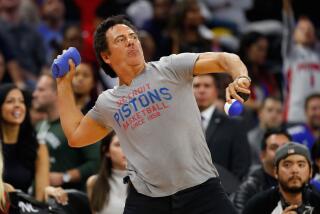Pep Boys auto parts chain agrees to sell itself to Gores Group
- Share via
A Los Angeles private equity firm wants to drive off with Manny, Moe and Jack.
Pep Boys, the iconic auto parts retailer that is synonymous with California’s car culture, said Monday that it has agreed to sell itself to Los Angeles-based Gores Group in a deal worth nearly $800 million.
Gores Group is paying $15 a share, a 24% premium over Pep Boys’ closing price of $12.08 on Friday. The stock jumped $2.85 on Monday to $14.93.
The deal has a provision in which Pep Boys can solicit higher bids until mid-March.
Pep Boys’ management team will stay in place and Gores intends to expand the company, said Ryan Wald, managing director of mergers and acquisitions at Gores Group. The firm does not anticipate closing any of Pep Boys’ 729 stores or laying off any of its roughly 19,000 employees, he said.
Pep Boys has about 100 locations in Southern California, most clustered in and around Los Angeles and Orange counties.
Founded by Alec Gores in 1987, Gores Group has acquired and operated more than 80 companies since its inception. Gores is the brother of Tom Gores, who runs a separate private equity firm, Platinum Equity in Beverly Hills.
“We’ve been keeping an eye on [Pep Boys] for quite some time and watching what this management team has been doing,” Wald said. “And what they have done is accomplish a good turnaround. We believe they’ve turned the corner and are primed for some real growth.”
The 91-year-old company is famous for its long history in California and its distinctive name: The full moniker is the Pep Boys — Manny, Moe & Jack. But it has struggled for years in a tough industry with a lot of competition.
Pep Boys’ shares topped $37 in 1996 but sank to less than $3 in 2009. The company lost money for four straight years before returning to profitability in early 2010.
Pep Boys’ woes stand in sharp contrast to the generally favorable environment for the auto parts and servicing industry in recent years. New-car sales fell sharply during the recession as cash-strapped consumers fixed up their old vehicles rather than splurge on new ones, a development that boosted the fortunes of rivals such as AutoZone Inc., Advance Auto Parts Inc. and O’Reilly Automotive Inc.
But Pep Boys shares have lagged behind those of rivals for at least a dozen years and its operating profit margin is “significantly behind,” said Cid Wilson, an analyst at Cabrera Capital Markets in New York. Pep Boys has been looking for a buyer for at least seven years, he said.
“This is a company that has had many challenges going back many years,” Wilson said. “It’s a company that is going to take a significant amount of time to turn itself around.”
Part of its problem, Wilson said, is that Pep Boys has both retail and service operations, very different businesses that can be difficult to manage. Almost all its competitors focus on one business or the other.
Pep Boys has a rich history, starting with the etymology of the company name.
Four friends — Emanuel (Manny) Rosenfeld, Maurice (Moe) Strauss, Moe Radavitz and Graham (Jack) Jackson — chipped in $200 each to open an auto supply store in Philadelphia, where the company is still based. Radavitz left after a few years.
The first half of the name came from a case of Pep Valve Grinding Compound, according to the company. The “Boys” tag came from a policeman who ticketed Philadelphia motorists for equipment violations and advised the drivers to go “see the boys” at Pep for new parts.
The owners’ names were added after Strauss traveled to California in 1923 and noticed that other businesses adopted their founders’ first names.
More to Read
Inside the business of entertainment
The Wide Shot brings you news, analysis and insights on everything from streaming wars to production — and what it all means for the future.
You may occasionally receive promotional content from the Los Angeles Times.









